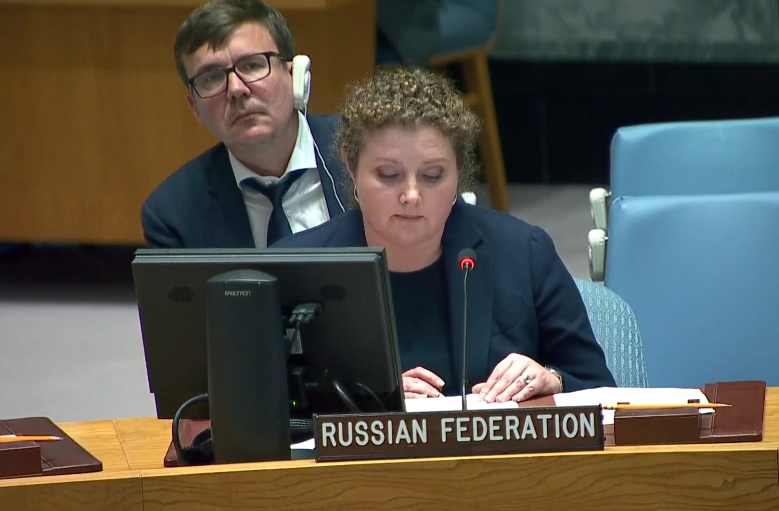Statement by Deputy Permanent Representative Anna Evstigneeva at UNSC meeting on Sudan
Madam President,
We are grateful to Special Representative of the UN Secretary-General Volker Perthes for updates on the situation in Sudan. We took note of the report of Harold Agyeman, Chair of the Security Council 1591Committee, Permanent Representative of Ghana to the UN on the work of this Security Council subsidiary body over the past 90 days. We welcome the participation of Sudan's Permanent Representative to the UN, Al-Harith Idris in today's meeting. We listened carefully to Ibrahim Mudawi.
Sudan is still going through a difficult period. The country's political landscape remains divided and polarized. In the context of the suspension of a significant part of donor assistance, humanitarian and socio-economic challenges remain unresolved.
We are concerned about the stalemate that we observed last July in the negotiations between local political forces facilitated by the UN Tripartite mechanism, the African Union and IGAD. At the same time, we note the multiplying initiatives to overcome this challenge. We are convinced that their success will depend on the ability to make them inclusive with the participation of all politically significant forces of the country.
Against this background, we welcome the important steps taken by the Government of Sudan to stabilize the political situation and its demonstrated readiness to achieve a compromise. In particular, we have taken note of the statement of the Chairman of the Supreme (Sovereign) Council al-Burhan dated July 4 this year, in which he announced the military leadership would end its participation in the intra-Sudanese political process in order to enable civilian politicians themselves to agree on the modalities of a new transitional government, as well as a statement about the readiness of the military to dissolve the Supreme (Sovereign) Council, concentrating on the defense and national security issues. We consider this step a manifestation of responsibility and constructive attitude on the part of the country's leadership.
We remain convinced that the people of Sudan are able and must solve their internal problems independently. We consider military intervention in the affairs of sovereign Sudan unacceptable. The results of the attempts to create dubious democratization and socio-economic models according to Western patterns are well-known. It only exacerbated the hardships of the Sudanese people and undermined confidence in the transitional civil authorities. We do not think that the events of October 25, 2021 can be interpreted as a "coup", the way it is done in the report on the work of UNITAMS, actively supported out by a number of colleagues on the Council, primarily Western ones.
We also consider it unacceptable that this document links the resumption of international assistance for the development of Sudan with the transfer of power to a civilian government. The mobilization of international support for a country facing various challenges is not a reward for some achievements or domestic political actions, but one of the main tasks of the special political mission. Otherwise, such preconditions can be regarded as an act of manipulation and an instrument of pressure on the Sudanese authorities. In this regard, we strongly urge Volker Perthes, head of UNITAMS to act strictly in accordance with his mandate, each component of which deserves equal attention. Otherwise, you may lose the trust of the Sudanese authorities and, which is no less important, the Sudanese people, and this can seriously undermine the UN presence. We would not like to see such a turn of events.
Madam President,
We fully support the measures taken by the Government of Sudan to bring the life in Darfur back to normal and stop outbreaks of intercommunal violence. We welcome the fact that the first 2,000-strong Joint Security Forces recently completed training in the region in June. We welcome the long trip of the Deputy Chairman of the Supreme (Sovereign) Council Mohamed Hamdan Dagalo to Darfur, the reconciliation initiatives put forward during it and other corresponding activities. We believe that this work requires more coverage in the reporting of the UN Secretary General.
Madam President,
We believe that the arms embargo imposed on Sudan 17 years ago no longer corresponds to the situation on the ground in Darfur, hinders the implementation of the authorities' plans in the field of state building, maintaining law and order, as well as the socio-economic development of the region. In this regard, we are disappointed by the decision of the US curators of the Sudanese sanctions dossier to stop the work on the Security Council document on benchmarks for lifting the arms embargo. We consider such approach irresponsible, and as a result, the UN Security Council sabotages its own decisions on revising the Sudanese sanctions for the second year in a row.
Thank you.
